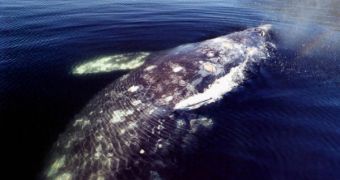The environment in which we developed, made up of sounds, images, tastes and touches, is incredibly complex when compared with that of whales. These noble animals live in a world where seeing is limited to a few meters at best, but where hearing is king. The best of these animals can communicate over unbelievably long distances, through “clicks” that can be heard for miles around. Now, their ability to feed, communicate and organize may be destroyed by human interference.
While the International Whaling Commission (IWC) will meet this week to discuss the fate of whales, and to determine future strategies on if and how it will allow countries to cull them, it's highly unlikely that officials will bring up the issue of oceanic noise pollution. It has been proven scientifically that the sonar equipment onboard most ships today is one of the main things that confuse whales, as they become unable to locate each other. Some researchers have even argued that it's human-generated noises in the oceans that cause mass strandings of whales on beaches, especially in Tasmania.
According to scientific assessments, the levels of noise that can nowadays be heard in oceans are roughly similar to what human associate with airplanes taking off and rock concerts. Engine roars and military-grade sonars are so loud, that they can at times be heard throughout the oceans of the world, from the Pacific to the Atlantic. As far as the large animals go, the low-frequency sounds emitted by blue whales can be heard around the world as well, but the natural noises inside the oceans, to which the whales have adapted in millions of years, are currently being changed by human activity.
Marine biologists say that these sounds are just as dangerous for the animals as harpoons. Because their ability to use their natural sonar is hindered by artificial sounds, the whales find it difficult to locate their prey at times, and to hunt for fish schools roaming the oceans. Also, coordinating attacks within a whale pod becomes increasingly difficult, and straight out impossible at times, for the exactly same reason.
“We know very little about the effects of noise pollution, though the more we learn, the scarier it is. And we know little about whale talk, though the more we learn, the more interesting it is,” Dalhousie University Biologist Hal Whitehead, who is one of the foremost experts in the field of whale vocalization, said. He added that sound pollution had thus far been associated with some whale pods beaching themselves on islands they couldn't detect, as well as with pods departing their usual habitats, in search for quieter waters, Wired reports.

 14 DAY TRIAL //
14 DAY TRIAL //